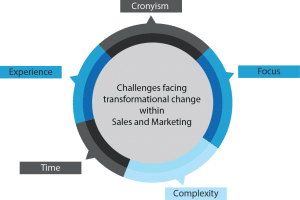You have identified that there is a sales and or marketing transformational change project that will positively impact your revenue projections when delivered. From previous experience, you know that the implementation of similar projects have suffered and produced less than desirable results.
Our perspective, based on both research and experience is that 70% of transformational change or improvement projects fail to deliver anticipated results. As CEO’s should you accept these fail rates as status quo, or review your approach and become part of the positive statistic.
The costs associated with poor or inadequate implementation can have a massive and sustained impact on top and bottom-line profits. In addition to direct costs, we must also consider the impacts on sales excellence, sales transformation, sales turnarounds, sales improvement, CRM implementation, marketing re-alignment, restructuring, and breaking into new markets.
Often challenges that businesses face when implementing significant projects are:

Challenge #1 Cronyism – In this scenario a company decides to embark on a nominated project and an individual within the company is chosen as the sponsor. The person is selected for their leadership skills and most likely their longevity with the business. They understand how things are done around the company so it is believed they will be best suited to managing the project.
Often the problem with this approach is that most projects around sales and marketing are transformational by nature. In these situations, the sponsor often compensates for by change reverting to ‘the old ways’ of doing business, therefore limiting the companies evolutionary opportunity. This mindset may significantly frustrate successful outcomes.
Challenge #2 Focus – In this scenario the company often embarks on transformation projects and has become known for it. Each year there is a new focus that lasts for a short time, then things go back to normal. Midway through the process, something else looms into focus and the project is put on hold or stopped whilst the new issues are addressed.
This lack of focus has an enormous impact on the culture of the company and sets a precedent for future projects to fail. These are often the most difficult to remedy if sponsored internally as the mindset has become ingrained within the culture that, it’s ok not to complete projects.
Challenge #3 complexity – The project starts off well and then seems to take many different twists and turns along the way. It ends up being a project that exceeds the scheduled project plan for many months. Although the outcomes are satisfactory, they do not deliver on the initial objectives. The company justifies this by attributing the outcome to the perceived higher complexity of the project than initially thought.
The challenge in this scenario is that the project scope was not sufficiently defined. Poorly defined projects inadvertently provide poor measurement for milestones and timelines. To ensure that that project stays relevant it is critical that the scope is defined and that the sponsor ensure that the organisation stays on track.
Challenge #4 Time – The project is delegated to someone in the business who already has a full-time commitment to work. They are passionate and are looking to be seen as successful in the business so they willingly accept the challenge. They believe everyone will be supportive, and the outcome can be achieved through weekly meetings and that people will engage with the task requirements.
Unfortunately, this approach is common. The time commitment for simple projects sales and marketing transformational projects is about twenty hours per week and much more for complex undertakings. Complex projects challenge cultures to the core and require a full-time commitment from the sponsor.
Challenge #5 Experience – The Company decides to embark on a new set of skills and standards in how it will operate. The lead person may have good leadership skills but they do not have the depth of experience and knowledge of subject matter required to manage change. In most scenarios, transformational projects are extremely hands-on. If a person is new to the subject matter they can easily be sidetracked.
The change leader must be the epitome of how you want your business to be if you want your project to succeed.
In summary, the challenges of transformation projects may include some or all of the following:
- Desire to keep the status quo and using known and internal sponsors
- Lack of focus and dedication to the planned objectives
- Poorly defined scope
- Improper time management
- Poor allocation of resources
To ensure the successful implementation and delivery of transformational change projects, companies often find success by engaging with a dedicated interim external project leader. This engagement ensures that the sponsor has the depth of experience required and is fully accountable for the end results within a set time frame.
Interim management maintains revenues in times of change by:
- Taking operational responsibility for the project,
- Proposing and implement an action plan to achieve set objectives under the guidance of our CEO, Adele Crane,
- Bringing the personal experience of dealing with the particular issues in sales and marketing,
- Having sensitivity to your company’s ethos but not constrained by its politics, personalities, or protocols,
- Setting the conditions for future success and prepares for a permanent managerial solution if required.
This eBook will also provide you with further information on the profile of the sales transformation leader and how we can work successfully with you.

To discuss your next transformational change project and deliver significant value to your business, please reach out and contact the office to organise a time to talk.
If you found this article helpful, follow us on LinkedIn or subscribe to Our Insights on the right-hand column of this page, to make sure you don’t miss new posts.
© 2014 Sales Focus Advisory. All Rights Reserved
